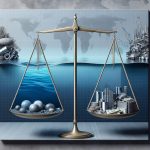The Federal Reserve, influenced by fluctuating global economic conditions, is not predicted to raise interest rates in the near future. This decision creates potential benefits for investors and borrowers by influencing asset prices, exchange rates and the cost of borrowing.
This situation may change, however, if global economic conditions stabilize and improve, prompting the Federal Reserve to consider adjusting rates. Such a move may then swing the economic momentum in favor of savers and tighten the borrowing climate.
The decision not to raise rates touches all corners of the economy. Businesses may find it cheaper to borrow money for investment, loans and mortgages may become more affordable for consumers, and investors may find potential in this loose monetary environment.
Observers suggest the Federal Reserve’s strategy is heavily influenced by the unstable and ambiguous global market. The institution is responsive and recalibrating its policies to navigate worldwide market forces. If global market uncertainties persist, further adaptations by the Fed are to be expected.
The world economy is projected to experience further inconsistencies, potentially influencing the Federal Reserve’s decisions. These fluctuations may force global central banks, including the Federal Reserve, to re-evaluate their strategies and modify their policies. This might involve reconsidering their investment strategies and interest rate plans to alleviate potential economic instability.
The Federal Reserve’s decision not to increase rates aims to stimulate economic expansion and encourage spending. It is an attempt to nudge investors, businesses – and ultimately consumers – to borrow and spend more instead of saving. This strategy could lead to job creation, higher corporate profits, and contribute to an overall uptick in economic activity.
However, it’s crucial to note that this strategy might also result in increased debt levels, which have potential to become problematic if not well-managed. Furthermore, businesses could use this opportunity to expand their operations or invest in research and development, potentially leading to breakthroughs and improved market performance.
In conclusion, significant modifications in the Federal Reserve’s current methods may not happen immediately due to international economic instability. The Federal Reserve must balance many factors before any rate changes. These factors include the job market’s current situation, inflation rate, the general state of the economy, and domestic political climate.
The impact of the Federal Reserve’s decision will largely depend on various factors such as global economic conditions, consumer confidence, inflation rates, and governmental policies. Thus, timely, transparent communication with the public will be a priority in addressing any queries or concerns, and fostering a sense of collective responsibility for these crucial financial issues.







